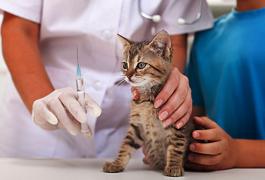Should You Vaccinate Your Indoor Cat?

Should You Vaccinate Your Indoor Cat?
I suspect this is a question every veterinarian is asked at least once a day and I also suspect there are many cat families with this question in their minds as well. Research shows the average cat sees their veterinarian less than once a year, suggesting that some cat owners have answered the question without the input of their cat’s veterinarian and answered the question with a NO!
Common Cat Vaccines
Most vaccinated cats receive two separate vaccines which the American Association of Feline Practitioners has designated core vaccines: a rabies vaccine and a trivalent vaccine against feline herpes virus, panleukopenia virus and calicivirus also known as FVRCP.
Herpes virus and calicivirus cause upper respiratory signs and panleukopenia is the feline version of canine parvovirus, a deadly diarrhea-causing virus. In addition to cats, rabies can affect wildlife, dogs and humans, and infection with the rabies virus is nearly always fatal.
Why Vaccinate Cats Against Rabies?
Some state and local governments mandate rabies vaccinations for cats and nearly all municipalities require dog rabies vaccinations. This regulation arises from a concern on the part of our government for public health and because cats are the domestic animal most commonly infected with rabies. Two hundred and forty-seven cases of feline rabies as compared to 89 cases of canine rabies were reported in the United States in 2013, the most recent year with data available.
Vaccinating your pets protects not only your cat (and dogs) against the deadly rabies virus, but helps protect your family from exposure to rabies. When you have pets, crazy things happen. Your cat might escape and meet up with a rabid raccoon in the backyard or a bat might fly down your chimney. Both of these species of wild animal could transmit rabies to your cat. Whether your veterinarian chooses an annual or tri-annual rabies vaccine may be determined by government regulations.
Why Vaccinate Cats with FVRCP Vaccine?
The other core feline vaccine protects cats against feline specific diseases. Feline herpes virus and calicivirus frequently cause upper respiratory signs in cats – coughing, sneezing, runny eyes, sores in the mouth and even joint pain. Like our own annual influenza vaccine, FVRCP lessens the signs of viral infection and the length of illness, but does not prevent infection completely. Panleukopenia virus infection results in a severe diarrhea disease in infected cats and is frequently fatal. FVRCP is very effective at preventing panleukopenia. If your cat lives indoors, you might ask where she could contract these infections. Vaccination with FVRCP is protecting your cat, not at home, but in the unforeseen situation where she must board while you are away, or she requires hospitalization for an illness or injury or when you can’t resist adding a second fur baby to your family. Vaccination of cats in multiple cat families is important, since cats in multiple cat households are more likely to experience upper respiratory infections.
My Answer Is…
You might have guessed my answer to the question, “Should you vaccinate your indoor cat?” is yes. The American Association of Feline Practitioners also recommends rabies vaccination for cats based on the local regulation and a tri-annual FVRCP vaccination to keep your cat in tip top shape.

































